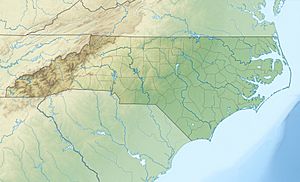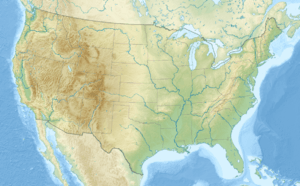Scott Creek (Trent River tributary) facts for kids
Quick facts for kids Scott Creek |
|
|---|---|
|
Location of Scott Creek mouth
|
|
| Other name(s) | Tributary to Trent River |
| Country | United States |
| State | North Carolina |
| County | Jones |
| Physical characteristics | |
| Main source | Bachelor Creek divide about 3 miles northeast of Pollocksville, North Carolina 36 ft (11 m) 35°03′49″N 077°12′12″W / 35.06361°N 77.20333°W |
| River mouth | Trent River Jones Corner, North Carolina 0 ft (0 m) 35°02′54″N 077°11′09″W / 35.04833°N 77.18583°W |
| Length | 2.35 mi (3.78 km) |
| Basin features | |
| Progression | generally southeast |
| River system | Neuse River |
| Basin size | 2.57 square miles (6.7 km2) |
| Tributaries |
|
| Bridges | US 17 |
Scott Creek is a small stream located in Jones County, North Carolina, in the United States. It is about 2.35 mi (3.78 km) long. This means it's a little over 2 miles from where it starts to where it joins a bigger river. Scott Creek is a "tributary" to the Trent River. A tributary is a smaller stream or river that flows into a larger one.
Contents
The Journey of Scott Creek
Scott Creek begins its journey in a place called Jones Corner, North Carolina. This is where the water first gathers to form the creek.
Where Scott Creek Starts
The exact spot where Scott Creek begins is near a place called Bachelor Creek divide. It's about 3 miles northeast of a town named Pollocksville. At its very start, the land is about 36 ft (11 m) above sea level.
Flowing to the Trent River
From its starting point, Scott Creek flows generally towards the southeast. It continues on this path until it meets and joins the Trent River. The place where Scott Creek flows into the Trent River is also near Jones Corner, North Carolina. At this point, the elevation is about 0 ft (0 m) above sea level, meaning it's at the same level as the river it joins.
Understanding the Watershed
A "watershed" is an area of land where all the water drains into a single river, lake, or ocean. Think of it like a giant bowl where all the rain and snowmelt eventually flows to one main exit point.
Scott Creek's Drainage Area
The land area that drains into Scott Creek is about 2.57 square miles (6.7 km2). This means that all the rain and water that falls on this specific area will eventually make its way into Scott Creek.
Rainfall and Forests
Scott Creek's watershed receives a good amount of rain each year, about 54.0 inches. This rainfall helps keep the creek flowing. A large part of this watershed, about 36%, is covered by forests. These forests are important because they help keep the water clean and prevent soil from washing away into the creek.
 | Mary Eliza Mahoney |
 | Susie King Taylor |
 | Ida Gray |
 | Eliza Ann Grier |



